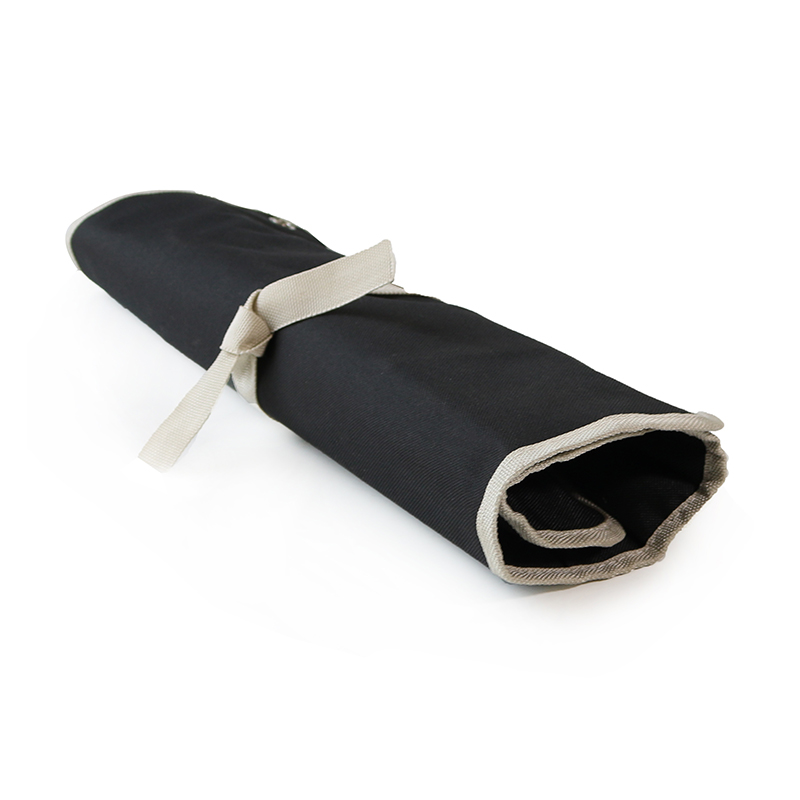Roll-up tool bag is a type of tool bag that is designed to conveniently store and transport a collection of tools. It gets its name from its ability to roll up tightly, making it easy to pack and store when not in use.
The bag typically has multiple pockets or compartments of varying sizes to accommodate a range of tools. It may also feature straps or loops to secure larger items in place.
Roll-up tool bags are often made of durable materials like canvas or nylon to withstand the wear and tear of regular use. They are popular among professionals and DIY enthusiasts alike for their portability and organization.
Some of the advantages of using a roll-up tool bag include:
Portability: Roll-up tool bags are lightweight and easy to transport, making them a great choice for those who need to bring their tools with them on the go.
Organization: With multiple compartments and pockets, a roll-up tool bag makes it easy to keep your tools organized and easily accessible.
Space-saving: When not in use, a roll-up tool bag can be rolled up tightly and stored in a small space, making it a great option for those with limited storage space.
Durability: Roll-up tool bags are often made of durable materials that can withstand regular use and the wear and tear of being transported from place to place.
Roll-Up Tool Bag,Roll Up Tool Pouch,Roll Up Tool Bag,Roll Up Bag For Tools ZHANGJIAGANG CITY XIANGLE TOOL CO., LTD. , https://www.xiangletoolbag.com

Why Copper is Used to Make Electrical Wires?
For nearly two hundred centuries, copper has reigned supreme as the ideal material for electrical wiring, and for very good reasons. Ever since the invention of the telegraph and electromagnet in the 1800s, copper's popularity surged, particularly after the introduction of the telephone in 1876. Today, copper finds its place in countless technologies and applications, whether it’s powering homes, running through kitchen appliances, or serving as the backbone of modern computing systems. Of course, we all know that copper remains the go-to choice for creating electrical wires due to its unmatched reliability.
Now, let’s delve into what makes copper the gold standard for electrical wiring. Read on to discover its unique advantages.
First and foremost, copper is incredibly cost-effective. While metals like silver and gold may offer slightly better conductivity, they come at a premium price without offering substantial additional benefits. Copper, on the other hand, strikes the perfect balance between affordability and performance. It’s not only easier on your wallet but also simpler to work with during production. Its malleability makes it easier to shape and mold into intricate designs without requiring excessive effort.
Copper also boasts impressive ductility, meaning it can be bent and twisted with minimal risk of breaking. This flexibility is crucial for threading wires through tight spaces like floors, walls, or ceilings. Unlike other materials that might lose strength or efficiency when bent, copper maintains its integrity and conductivity, ensuring reliable performance even under stress.
Another standout feature of copper is its exceptional thermal resistance. Over the years, numerous studies have highlighted how copper wiring significantly reduces the risk of overheating, a common culprit behind electrical fires. For instance, statistics show that between 2015 and 2019, electrical wiring caused approximately 614 property fires annually in Canada. However, as more households transitioned from aluminum to copper, these risks diminished considerably. Copper’s ability to withstand extreme temperature fluctuations makes it an invaluable asset in maintaining safe and long-lasting electrical connections.
When it comes to conductivity, copper leaves competitors in the dust. Unlike many other metals, copper allows electrons to move freely, facilitating smooth and efficient flow of electricity. This unparalleled efficiency ensures uninterrupted power supply, which is vital for both residential and commercial settings.
Additionally, copper exhibits remarkable resistance to corrosion. A protective oxide layer naturally forms on its surface, safeguarding it from environmental factors. Should this layer degrade over time, regular inspections can help identify potential issues before they escalate. Thanks to its robust corrosion-resistant properties, copper wiring is suitable for diverse environments, including harsh industrial settings, rural areas, and coastal regions.
Perhaps most importantly, copper holds the "gold standard" in electrical wiring due to its versatility and compatibility with modern infrastructure. Whether you're outfitting a small apartment or a sprawling corporate office, copper remains the trusted choice worldwide.
The abundance of copper further cements its status as the ideal material for electrical wiring. Geological surveys reveal vast reserves of copper beneath Earth's surface, making it readily available and relatively inexpensive. This availability ensures consistent supply and cost stability, unlike rarer metals like aluminum, which often require more frequent maintenance and replacement.
In conclusion, copper stands out as the premier option for electrical wiring thanks to its affordability, flexibility, safety, and widespread availability. If you're looking for top-tier copper electrical wires, look no further than KEI Industries.
As a leader in the electrical wiring industry, KEI Industries has been setting benchmarks since 1968. With over 5,000 channel partners globally, KEI specializes in producing high-quality electrical wires and cables tailored to meet diverse customer needs. Visit our website or reach out via email for detailed information about our products or to inquire about custom solutions. Trust KEI Industries to deliver excellence in every strand of copper wire.